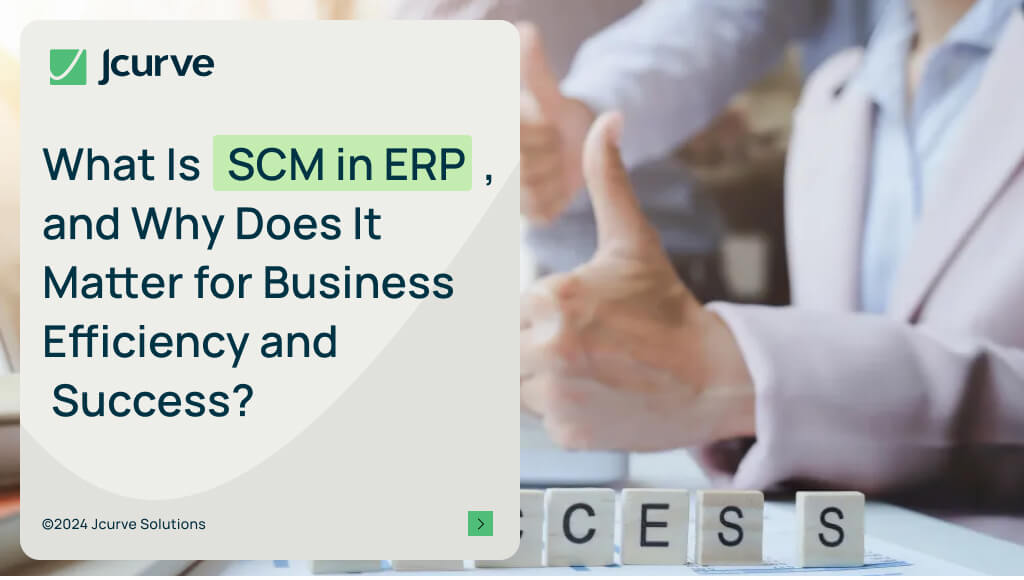
ในธุรกิจสมัยใหม่ การจัดการห่วงโซ่อุปทาน (SCM) ถือเป็นหัวใจสำคัญ มีบทบาทสำคัญในการประสานการไหลเวียนของสินค้าและบริการจากต้นทางไปสู่ผู้บริโภคอย่างราบรื่น แก่นแท้ของ SCM อยู่ที่การประสานงานอย่างละเอียดของกระบวนการจัดซื้อ การผลิต และการจัดจำหน่าย เพื่อให้มั่นใจว่าผลิตภัณฑ์ถูกส่งมอบอย่างมีประสิทธิภาพและประสิทธิผล
ประวัติของระบบ ERP
ประวัติของระบบการวางแผนทรัพยากรองค์กร (ERP) เป็นการเดินทางที่น่าสนใจของวิวัฒนาการและนวัตกรรม ซึ่งกำหนดรูปแบบการดำเนินธุรกิจในปัจจุบัน
- ทศวรรษ 1970: แนวคิดของการวางแผนความต้องการวัสดุ (MRP) เกิดขึ้น วางรากฐานสำหรับ ERP
- ทศวรรษ 1980: MRP พัฒนาเป็น MRP II โดยรวมฟังก์ชันทางธุรกิจเพิ่มเติม
- ทศวรรษ 1990: ระบบ ERP เริ่มก่อตัวขึ้น บูรณาการกระบวนการทางธุรกิจต่างๆ
- ทศวรรษ 2000 เป็นต้นมา: ฟีเจอร์ SCM ถูกบูรณาการเข้ากับระบบ ERP มากขึ้น เพิ่มประสิทธิภาพและความโปร่งใสในห่วงโซ่อุปทาน
5 ขั้นตอนของ SCM ใน ERP
- การวางแผน: กำหนดทิศทางเชิงกลยุทธ์สำหรับการดำเนินงานห่วงโซ่อุปทาน เพิ่มประสิทธิภาพทรัพยากรและคาดการณ์ความต้องการ
- การจัดหา: จัดการความสัมพันธ์กับซัพพลายเออร์และการจัดซื้อ รับรองคุณภาพและความพร้อมของวัสดุตามเวลาที่กำหนด
- การผลิต: ดูแลกระบวนการผลิต รับรองการทำงานที่มีประสิทธิภาพและการควบคุมคุณภาพ
- การจัดส่ง: ประสานงานด้านโลจิสติกส์เพื่อให้มั่นใจว่ามีการจัดส่งผลิตภัณฑ์ให้กับลูกค้าอย่างตรงเวลาและถูกต้อง
- การคืนสินค้า: จัดการการคืนสินค้าอย่างมีประสิทธิภาพ นำข้อเสนอแนะมาใช้ในการปรับปรุงคุณภาพและห่วงโซ่อุปทาน
โมดูล SCM ใน ERP
ฟังก์ชันการทำงานและการบูรณาการกับห่วงโซ่อุปทานแบบขยาย
โมดูล SCM ในระบบ ERP มีบทบาทสำคัญในการรวมศูนย์และปรับปรุงกิจกรรมห่วงโซ่อุปทานให้มีประสิทธิภาพ แต่ขีดความสามารถของมันขยายไปไกลกว่าการจัดการห่วงโซ่อุปทานโดยตรง ด้วยการนำแนวคิดของห่วงโซ่อุปทานแบบขยายมาใช้ ระบบ ERP ช่วยให้เกิดการประสานงานที่ไม่มีใครเทียบได้ ซึ่งครอบคลุมไม่เพียงแค่ซัพพลายเออร์โดยตรงเท่านั้น แต่ยังรวมถึงซัพพลายเออร์รอง ผู้จัดจำหน่าย และลูกค้าด้วย แนวทางที่ครอบคลุมนี้ช่วยเพิ่มประสิทธิภาพและความโปร่งใสของห่วงโซ่อุปทานโดยรวมอย่างมีนัยสำคัญ
การประสานงานที่ราบรื่น: จากการจัดหาวัตถุดิบจากซัพพลายเออร์รองไปจนถึงการส่งมอบผลิตภัณฑ์สุดท้ายให้กับลูกค้า ทุกขั้นตอนได้รับการประสานงานและมองเห็นได้ภายในระบบ ERP
ความโปร่งใสที่เพิ่มขึ้น: ข้อมูลแบบเรียลไทม์จากทุกส่วนของห่วงโซ่อุปทาน รวมถึงซัพพลายเออร์รอง และผู้จัดจำหน่าย สามารถเข้าถึงได้ ทำให้มั่นใจว่าการตัดสินใจจะอยู่บนพื้นฐานของข้อมูลที่ครอบคลุม
ประสิทธิภาพของห่วงโซ่อุปทาน: ด้วยการจัดการห่วงโซ่อุปทานแบบขยาย ระบบ ERP ช่วยให้ธุรกิจเพิ่มประสิทธิภาพการดำเนินงาน ลดต้นทุน และปรับปรุงเวลาการจัดส่ง ส่งผลให้เกิดความได้เปรียบในการแข่งขันในตลาด
SCM ช่วยธุรกิจอย่างไร
การบูรณาการ SCM กับองค์ประกอบอื่นๆ ของ ERP เช่น การเงิน ทรัพยากรบุคคล และการขาย ช่วยให้มั่นใจว่ามีการไหลเวียนของข้อมูลและกระบวนการอย่างราบรื่นทั่วทั้งองค์กร แนวทางแบบองค์รวมนี้ให้ประโยชน์มากมาย:
เพิ่มประสิทธิภาพและประหยัดต้นทุน: การมองเห็นแบบเรียลไทม์และกระบวนการจัดซื้อที่มีประสิทธิภาพช่วยเพิ่มประสิทธิภาพการจัดการสินค้าคงคลัง ลดของเสียและค่าใช้จ่ายในการจัดเก็บ สิ่งนี้ เมื่อรวมกับการทำงานอัตโนมัติและการเพิ่มประสิทธิภาพ ช่วยลดต้นทุนการดำเนินงานโดยรวมอย่างมีนัยสำคัญ
เพิ่มประสิทธิภาพและความพึงพอใจของลูกค้า: การเติมเต็มคำสั่งซื้อที่ดีขึ้น ขับเคลื่อนโดยเวลาในการประมวลผลที่เร็วขึ้นและการจัดส่งที่แม่นยำ ช่วยเพิ่มความพึงพอใจของลูกค้าโดยตรง การเข้าถึงข้อมูลและการวิเคราะห์แบบเรียลไทม์ช่วยสนับสนุนการตัดสินใจอย่างมีข้อมูล เพิ่มการตอบสนองต่อการเปลี่ยนแปลงของตลาด
การทำงานร่วมกันและการปรับตัว: การทำงานร่วมกันที่ดีขึ้นระหว่างพันธมิตรในห่วงโซ่อุปทานและการดำเนินงานที่ยืดหยุ่นและปรับขนาดได้ ช่วยให้ธุรกิจสามารถปรับตัวให้เข้ากับความต้องการของตลาดได้อย่างรวดเร็ว การวิเคราะห์ขั้นสูงสำหรับการจัดการความเสี่ยงยังช่วยให้มั่นใจถึงความยืดหยุ่นของห่วงโซ่อุปทานต่อการหยุดชะงักที่อาจเกิดขึ้น แนวโน้มและทิศทางในอนาคตของ SCM และ ERP
แนวโน้มปัจจุบันของ SCM และ ERP สำหรับปี 2024
ในปี 2024 ภูมิทัศน์ของ ERP จะถูกเปลี่ยนแปลงด้วยคลื่นของเทคโนโลยีขั้นสูง โดยเฉพาะในโมดูลการจัดการห่วงโซ่อุปทาน (SCM) ซึ่งจะช่วยเพิ่มประสิทธิภาพและความสำเร็จทางธุรกิจอย่างมีนัยสำคัญ
- การบูรณาการ AI และ ML: การผสานปัญญาประดิษฐ์ (AI) และการเรียนรู้ของเครื่อง (ML) เข้ากับระบบ ERP โดยเฉพาะผ่าน AI แบบสร้างสรรค์ คาดว่าจะลึกซึ้งยิ่งขึ้น เทคโนโลยีเหล่านี้จะทำให้งานเป็นอัตโนมัติและให้ข้อมูลเชิงลึกแบบเรียลไทม์สำหรับการจัดตารางที่เหมาะสมที่สุด การคาดการณ์ความต้องการ และคำแนะนำส่วนบุคคล ช่วยเพิ่มการตอบสนองและประสิทธิภาพของห่วงโซ่อุปทานอย่างมาก
- AI แบบอธิบายได้ (XAI): XAI มุ่งหมายที่จะทำให้การตัดสินใจของ AI โปร่งใสและเข้าใจได้ สร้างความไว้วางใจในหมู่ผู้ใช้ ในระบบ ERP, XAI จะอธิบายเหตุผลเบื้องหลังการตัดสินใจที่ขับเคลื่อนด้วย AI เช่น คำแนะนำเกี่ยวกับห่วงโซ่อุปทาน โดยนำเสนอปัจจัยข้อมูลที่มีอิทธิพลอย่างชัดเจน
- การทำงานอัตโนมัติแบบไฮเปอร์: แนวโน้มนี้รวมการทำงานอัตโนมัติของกระบวนการหุ่นยนต์ (RPA), AI และ ML เพื่อทำให้กระบวนการทางธุรกิจทั้งหมดในระบบ ERP เป็นอัตโนมัติ ตั้งแต่การป้อนข้อมูลอัตโนมัติไปจนถึงการสอบถามบริการลูกค้าและการวิเคราะห์แนวโน้ม การทำงานอัตโนมัติแบบไฮเปอร์จะช่วยให้สามารถจัดสรรทรัพยากรมนุษย์ได้อย่างมีกลยุทธ์มากขึ้น
- ประสบการณ์ผู้ใช้ที่ดีขึ้น: การใช้ประโยชน์จากเทคโนโลยี AI ใหม่ๆ รวมถึงฟีเจอร์ที่ใช้งานด้วยเสียงบนพื้นฐานของการประมวลผลภาษาธรรมชาติ (NLP) ระบบ ERP จะใช้งานง่ายเหมือนการสนทนา ทำให้งานและการเข้าถึงข้อมูลง่ายขึ้น
- การติดตามความยั่งยืน: ด้วยการเน้นที่เพิ่มขึ้นเกี่ยวกับเกณฑ์ด้านสิ่งแวดล้อม สังคม และการกำกับดูแล (ESG) ระบบ ERP กำลังรวม ‘โมดูลสีเขียว’ โมดูลเหล่านี้จะติดตามและรายงานตัวชี้วัดความยั่งยืนที่สำคัญ เช่น การปล่อยมลพิษ การใช้พลังงาน และการสร้างของเสีย ปรับการดำเนินธุรกิจให้สอดคล้องกับเป้าหมายด้านสิ่งแวดล้อม
- ความปลอดภัยขั้นสูงด้วยบล็อกเชน: การนำเทคโนโลยีบล็อกเชนมาใช้ในระบบ ERP จะช่วยปรับปรุงความปลอดภัยและความโปร่งใส การปกป้องข้อมูลที่ละเอียดอ่อนและการรับรองการทำธุรกรรมที่ปลอดภัยและป้องกันการแก้ไข เทคโนโลยีบล็อกเชนจะแก้ไขข้อกังวลสำคัญเกี่ยวกับการฉ้อโกง ข้อผิดพลาด และการเข้าถึงโดยไม่ได้รับอนุญาต ในขณะเดียวกันก็เพิ่มความสมบูรณ์ของข้อมูลและความแท้จริงของผลิตภัณฑ์
แนวโน้มและเทคโนโลยีที่กำลังพัฒนาเหล่านี้ชี้ให้เห็นถึงอนาคตที่การบูรณาการ ERP และ SCM ไม่เพียงแต่ปรับปรุงการดำเนินงานให้มีประสิทธิภาพเท่านั้น แต่ยังเป็นผู้นำในด้านนวัตกรรม ความปลอดภัย และความยั่งยืน ซึ่งในที่สุดจะผลักดันธุรกิจไปสู่ความสำเร็จและประสิทธิภาพที่มากขึ้น
การนำ SCM ไปใช้ในระบบ ERP ของคุณ
การบูรณาการโมดูล SCM เข้ากับระบบ ERP ของคุณอาจดูน่ากลัว แต่การปฏิบัติตามแนวทางที่มีโครงสร้างสามารถทำให้กระบวนการง่ายขึ้นและรับรองความสำเร็จ
- การประเมินและวางแผน: ประเมินกระบวนการปัจจุบันของคุณและระบุพื้นที่ที่ SCM สามารถนำมาซึ่งการปรับปรุง พัฒนาแผนที่ชัดเจนโดยระบุวัตถุประสงค์ กรอบเวลา และทรัพยากรที่จำเป็น
- เลือก ERP ที่มี SCM ที่เหมาะสม: เลือกระบบ ERP ที่นำเสนอฟังก์ชันการทำงานของ SCM ที่แข็งแกร่งและสอดคล้องกับความต้องการทางธุรกิจของคุณ พิจารณาความสามารถในการขยายตัว ความง่ายในการใช้งาน และความสามารถในการบูรณาการ
- มีส่วนร่วมกับผู้มีส่วนได้ส่วนเสีย: ให้ผู้มีส่วนได้ส่วนเสียหลักจากแผนกต่างๆ เข้ามามีส่วนร่วมตั้งแต่เริ่มต้นกระบวนการ ข้อมูลของพวกเขาสามารถให้ข้อมูลเชิงลึกที่มีคุณค่าและช่วยให้มั่นใจว่าระบบตอบสนองความต้องการของทุกคน
- การย้ายข้อมูลและการบูรณาการ: วางแผนการย้ายข้อมูลที่มีอยู่ไปยังระบบใหม่อย่างรอบคอบและตรวจสอบให้แน่ใจว่ามีการบูรณาการอย่างราบรื่นกับแอปพลิเคชันทางธุรกิจอื่นๆ
- การฝึกอบรมและการสนับสนุน: ลงทุนในการฝึกอบรมที่ครอบคลุมสำหรับผู้ใช้เพื่อให้ได้ประโยชน์สูงสุดจากระบบใหม่ การสนับสนุนอย่างต่อเนื่องก็มีความสำคัญเช่นกันในการแก้ไขปัญหาที่อาจเกิดขึ้นหลังการนำไปใช้

Jessica has a Bachelor of Arts degree from Trent University and a Masters degree from Cambridge University. He is an Adjunct Professor of Finance at Simon Fraser University’s Beedie School of Business and is both a Canadian Chartered Professional Accountant and a UK Chartered Accountant.

Jessica has a Bachelor of Arts degree from Trent University and a Masters degree from Cambridge University. He is an Adjunct Professor of Finance at Simon Fraser University’s Beedie School of Business and is both a Canadian Chartered Professional Accountant and a UK Chartered Accountant.





